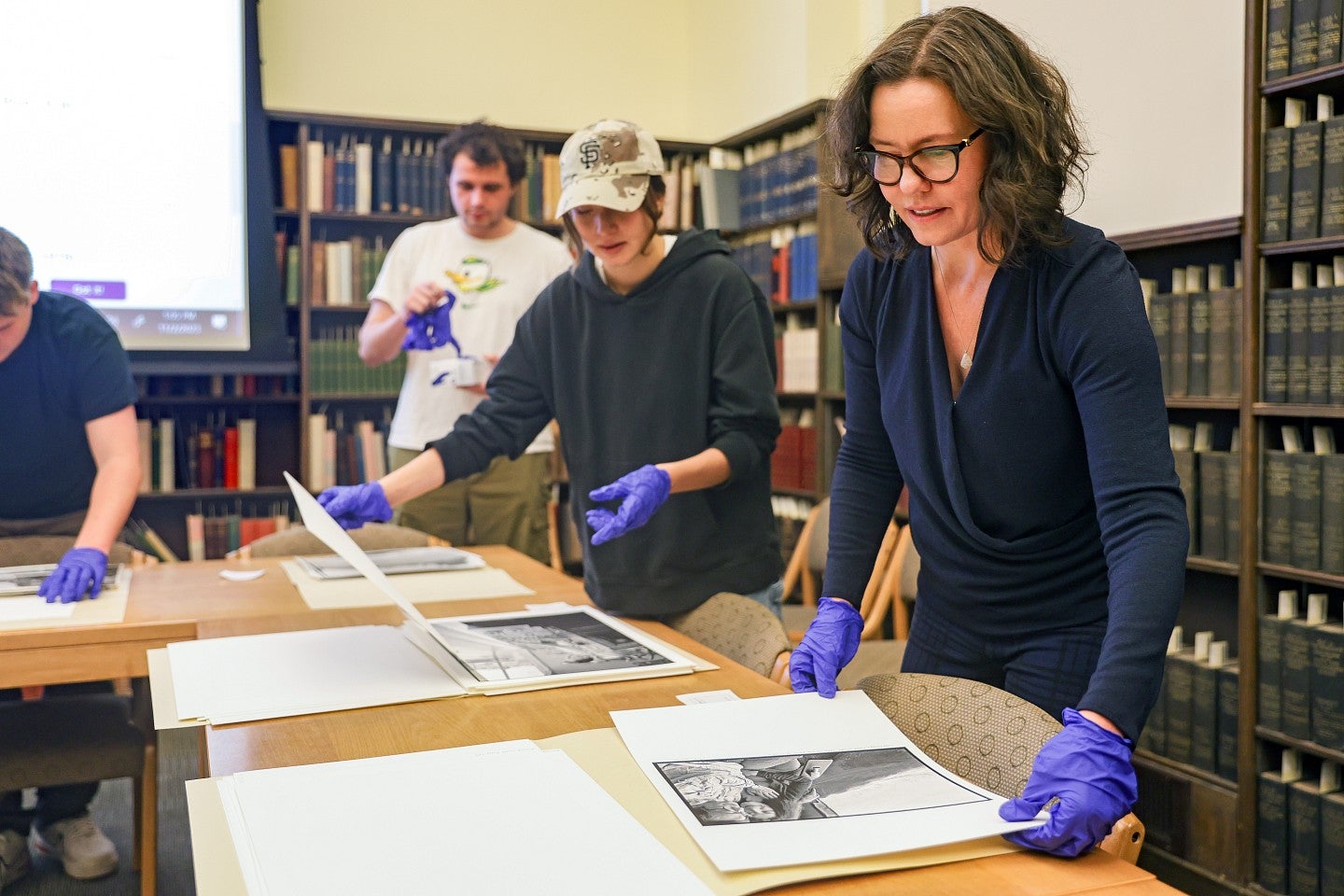
The world of media is one of the most influential forces in the modern world. Media studies is also one of the fastest-evolving fields, requiring constant research to understand.
Students in the undergraduate media studies program at the School of Journalism and Communication (SOJC) explore what’s happening with media on social, cultural and economic levels. They examine the media from ethical and global perspectives while gaining research and production skills that will allow them to be competitive in seeking and finding jobs in media industries and as scholars and teachers.
“You can’t understand society and its contemporary manifestations without understanding media,” said Gretchen Soderlund, director of the SOJC’s media studies undergraduate area.
Critical thinking in the undergraduate media studies major
While the other undergraduate majors and professional master’s programs in the SOJC tend to focus on specific career fields, the media studies undergraduate program prepares students for their next step in a more nuanced way.
“Media studies is a great major if you’re someone who wants to become a critical thinker and problem solver, think very deeply about the media and have a versatile degree that offers production skills and research and critical thinking skills,” said Soderlund.
According to Julianne Newton, director of the Communication and Media Studies master’s and doctoral programs, the SOJC’s media studies programs stand out from other schools.
“What the media studies undergraduate major does is enhance critical and cultural thinking about why we are producing the messages we are, about how we are producing them and what their effects are, and why those messages matter in culture and society,” said Newton.
In addition, media studies faculty teach courses across the core curriculum for all four undergraduate majors.
"If you're going out to be a professional journalist, for example, the fact that you've been required to study ethics, law and history and to think about gender, race and identity matters in media makes the work that you do much better, more effective, more sensitive to cultural issues in society, and more appealing because it considers all the different audiences who are going to be consuming your work," Newton said. "It is absolutely core to our school."
Choosing an area of specialization in the media studies major
Students with an undergraduate media studies degree learn skills from the SOJC’s required courses for all majors and then delve into one of four distinct pathways to prepare for the careers that most inspire them:
Media technologies and society
In media technologies and society, students examine the implications of new communication technologies such as augmented reality (AR), artificial intelligence (AI) and the gamification of media to understand their impact on culture and society. Students learn to assess the impact of emerging media technologies on everyday lives and respond to innovations in our technology-saturated world.
Media structures and regulation
For aspiring media ethicists or those interested in media policy and law, media structures and regulation is ideal for exploring the economic and regulatory underpinnings of the media. Students learn about how media, digital media and emerging media are organized, governed and regulated, and engage with questions of ethics, equality and democracy.
Culture, power and the media
Culture, power and the media confronts issues of representation, the power dynamics of the media, and how media produce and reproduce social, political and economic inequities. This specialization is ideal for students wanting to be media consultants or media producers who are attentive to issues of representation and committed to addressing representation in an ethical and informed way.
Documentary study and production
Combining the theory and history of documentary production with filmmaking and editing skill-building, documentary study and production is a specialized track for moving-image media — a.k.a. film — enthusiasts. Students research the impact of the medium and learn video production and critical thinking skills from award-winning documentary filmmakers.
“With a media studies degree, you learn really important research skills, including data analytics skills, digital research methods, documentary methods and interviewing — skills that any employer would want their employees to have,” said Soderlund.
Faculty are the pillars of the program
Faculty who teach in the media studies major are selected because of their expertise in each of the four niche concentrations. At the SOJC, students build professional and production skills that are not typically offered to media studies majors at other universities.
“We have so many faculty who understand and research these phenomena and really significant social and technological changes. We have professors who study AI, identity and gaming, the use of Twitter by fans, online trolling, media law, and we have faculty who study global media and look at the ways in which the media exists on a transnational level and global media flows,” Soderlund said. “We are really well positioned to be on the vanguard of understanding these developments and being able to evolve with them. Students get a very special and unique training here at the SOJC.”
Professor of documentary and film studies Mitchell Block, who has more than 50 years of experience as an Oscar Award-winning producer, drives the documentary program, along with award-winning filmmakers and professors Daniel Miller and Gabriela Martínez. Block credits Miller and Martínez for building an outstanding documentary and film program.
“The school is committed to training students and providing them with really useful courses. In some documentary programs, you aren’t being trained as a journalist to make moving-image media. As an undergraduate, being trained as a journalist to make documentaries is much better than being trained as a filmmaker to make documentaries,” said Block. “It’s a very different emphasis. The best documentary programs are housed in journalism schools.”
It’s clear to students that faculty bring their passion and enthusiasm into their classrooms every day. The unconventional tactics in media studies major Savannah Brown’s favorite course, J314: Intro to Media Studies, taught by Assistant Professor Whitney Phillips, left a lasting impact. Students analyzed the film “The Nightmare Before Christmas” through a Marxist lens, examining Jack Skellington as an “anti-hegemonic hero.”
“Journalism is so internal, but media is all around you,” Brown said. “In class, Professor Phillips used our physical space to exemplify Marxist class designations. It was so fun.”
Alumni and students credit media studies faculty for creating engaging classroom experiences by using different forms of tactile and visual learning. Media studies faculty make theories come alive and encourage students to solve today’s most pressing issues.
“The media studies program has some of the most interesting special topic classes. I don’t know any other major that gets to nerd out about reality TV and video games,” said alum Hayden Ogden ’21. “Amanda Cote, Gretchen Soderlund and Bish Sen were personal favorites during my time in the program because they taught me the two things I consume the most: video games and reality TV. It may sound silly, but these topics are things I consume constantly, so getting to look at the history and analyze how they’ve changed over time was so cool.”
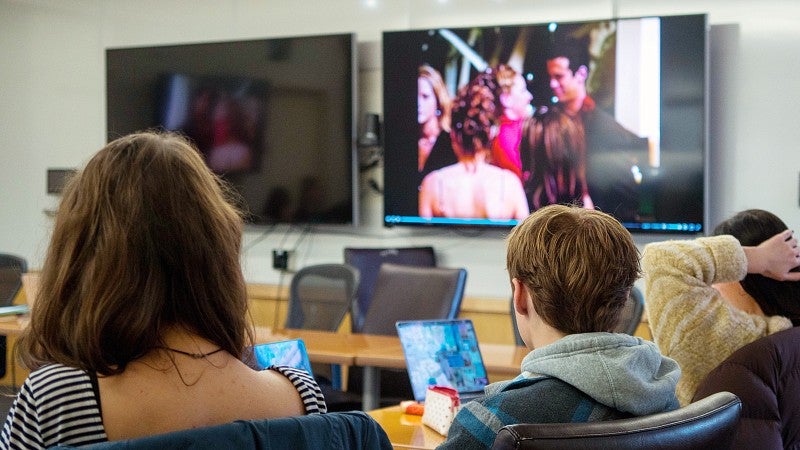
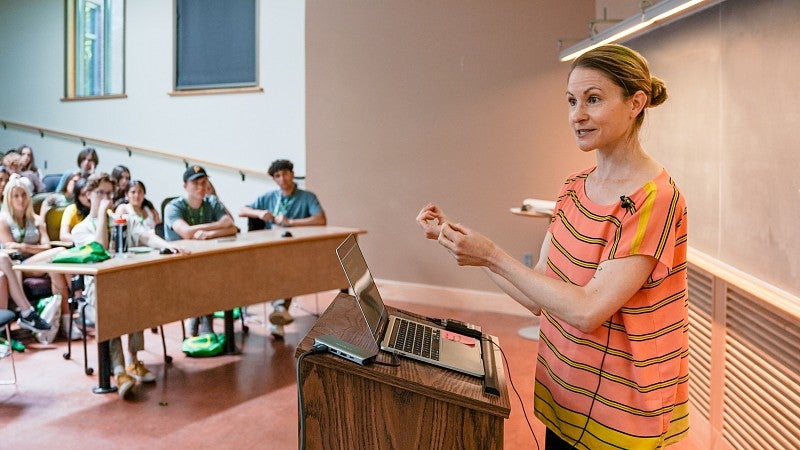
The next steps for media studies students
It is through the faculty’s diligent guidance that media studies alumni secure excellent post-graduate positions.
“I haven’t encountered a media studies program like this one in the past,” Soderlund said. “There’s a lot of cross-fertilization and interdisciplinary work within the school. The school focuses heavily on professional skills and transferable skills, and the media studies majors emerge from this program with this unique skillset that I haven’t seen before in other programs.”
Ogden is a self-proclaimed “media nerd” and passionate science communicator currently working in social media and marketing. She double-majored in advertising and media studies, which taught her to communicate succinctly to various audiences. Now Ogden stretches this strength daily as a social media specialist for a life sciences marketing firm.
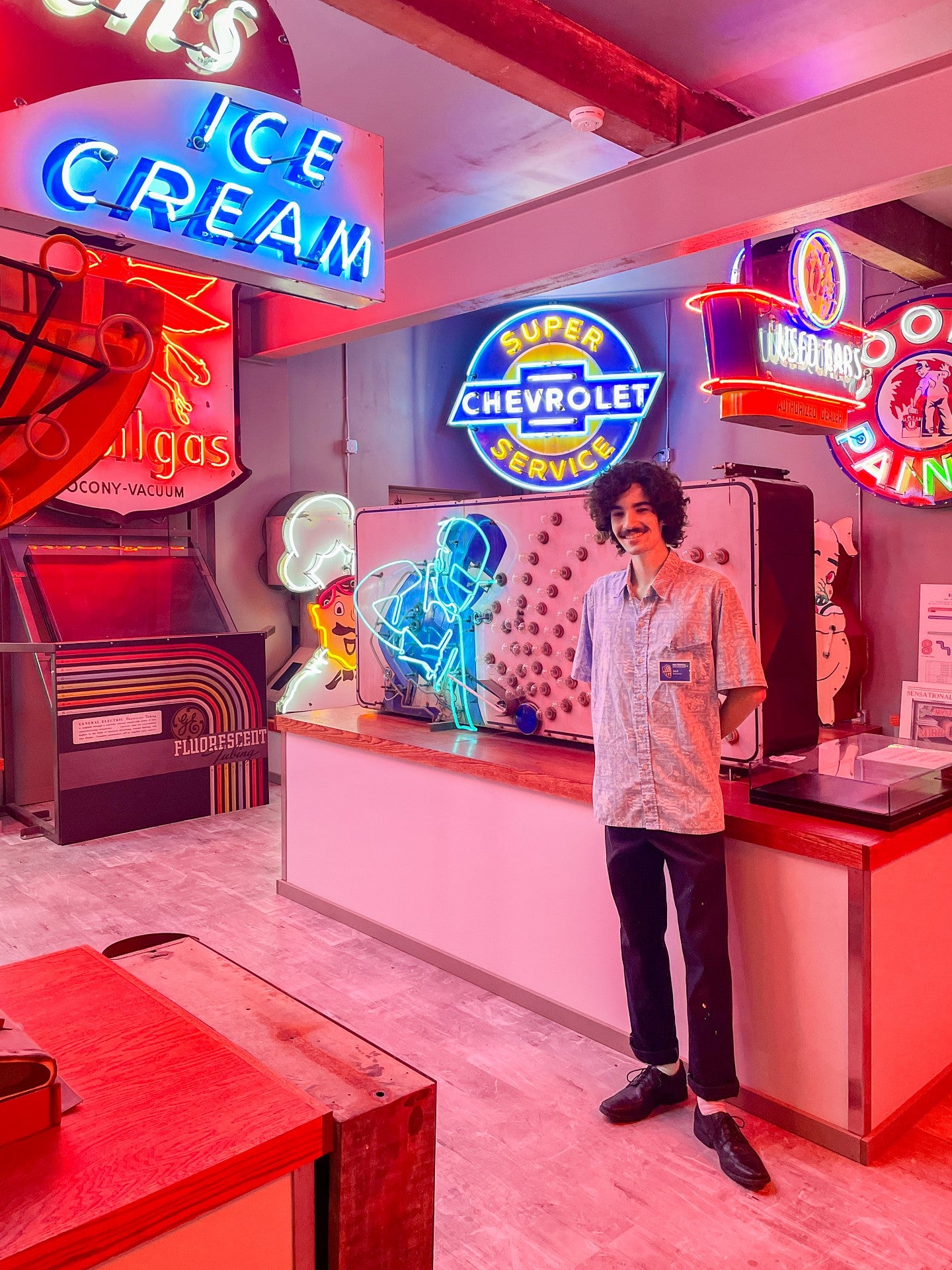
“I love being a nerd translator, taking big scary white papers and breaking them down in accessible and digestible everyday language,” she said. “I think the media studies program and the SOJC in general are really good at teaching its students to care about the ‘why’ of the content we consume and produce.”
Another SOJC alum, Jack Cochran ’21, is working as a marketing coordinator for the Portland architecture firm Ankrom Moisan. In his position, Cochran’s background in media studies continues to influence his skillset.
“I am now able to produce many different types of media collateral,” he said. “My background in media studies makes it much easier for me to formulate content in the sense that I know the methods of reaching certain audiences and holding their attention, and when to switch those methods for different audiences or purposes.”
Cochran was drawn to media studies because of its research aspect and emphasis on early media theorists like Theodor Adorno, Georg Wilhelm Friedrich Hegel and Marshall McLuhan. According to him, the most beneficial aspect of the program was the capstone project. The capstone project is a cornerstone of the media studies curriculum, and it gives students a research opportunity to delve deep into a single topic for an extended period. Cochran’s capstone focused on the history of neon signs from the Eisenhower administration through the 1970s. The project landed him his first post-grad job at the National Neon Sign Museum in The Dalles, Oregon.
Highlighting outstanding research in communication and media
Media studies faculty members conduct groundbreaking research and incorporate their work into their teaching to enhance students' information arsenal.
Professor and Emeritus Knight Chair in Communication Research Janet Wasko focuses some of her research on how the Walt Disney Company has maintained its control over the public and its deep influences in politics, economy and culture. She teaches the undergraduate course J431: Understanding Disney along with other courses surrounding the study of the film and entertainment industry in both the undergraduate major and the graduate programs.
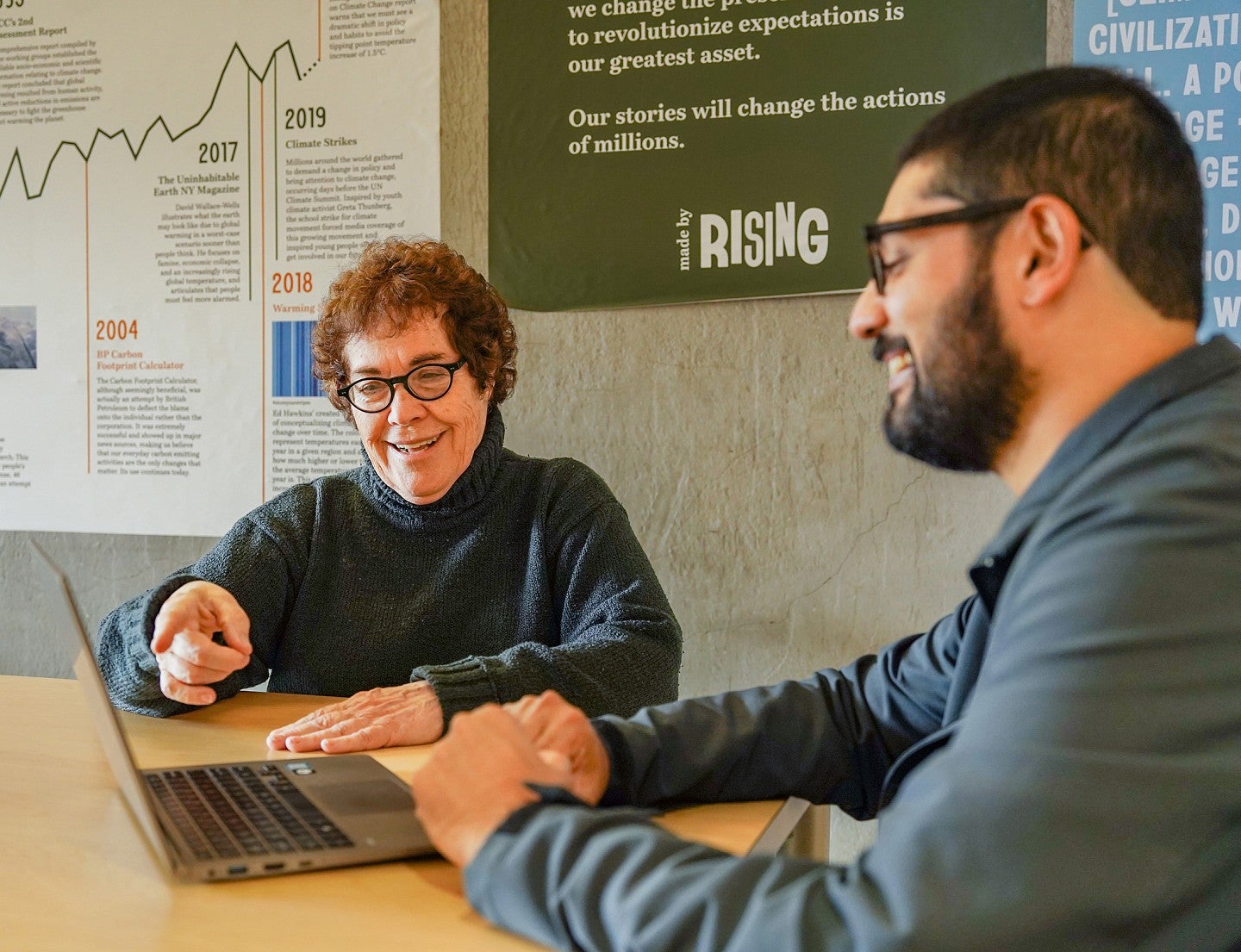
Assistant Professor of Media and Intersectionality Dayna Chatman is an expert on Korean popular music and its transnational, multicultural influence. Her interest in K-pop and fandom led her to closely examine Black American K-pop fandom.
“Black fans navigate this experience of a genre of music that gives them pleasure, but also these moments that they feel are insensitive with them,” she said.
Game studies — the study of games, gameplay and gamer culture — is another area where the SOJC is a leader. Doctoral students working in the SOJC’s Esports and Games Research (EGR) Lab use the school’s Immersive Media Lab and production studios in Allen Hall to conduct cutting-edge research on games and esports.
“The EGR Lab will be producing public-facing research by the end of the academic year and seeking partnerships with industry,” said Assistant Professor of Media Studies and Game Studies Maxwell Foxman, who directs the lab. Among other things, we hope to finish a census of all collegiate esports programs in the country, which has never been done by any other institution.”
While working at the EGR Lab, SOJC doctoral student Shane Burrell designed a study that brought virtual reality and esports together.
“That’s the beauty of the lab: the ability to throw your ideas out there and talk about them as a group to see how we can all work together on a particular study that advances ideas on how esports can be incorporated into many different specificities of research,” he said.
Media studies minors emphasize game studies and documentary production
The SOJC is currently building undergraduate minors in game studies and documentary production to mainstream both game journalism and moving-image media.
“The minor advances the field of game studies by providing a communications-focused approach to understanding how games impact storytelling and media professions, as well as giving students a foundation to understand what games are and how they work,” Foxman said.
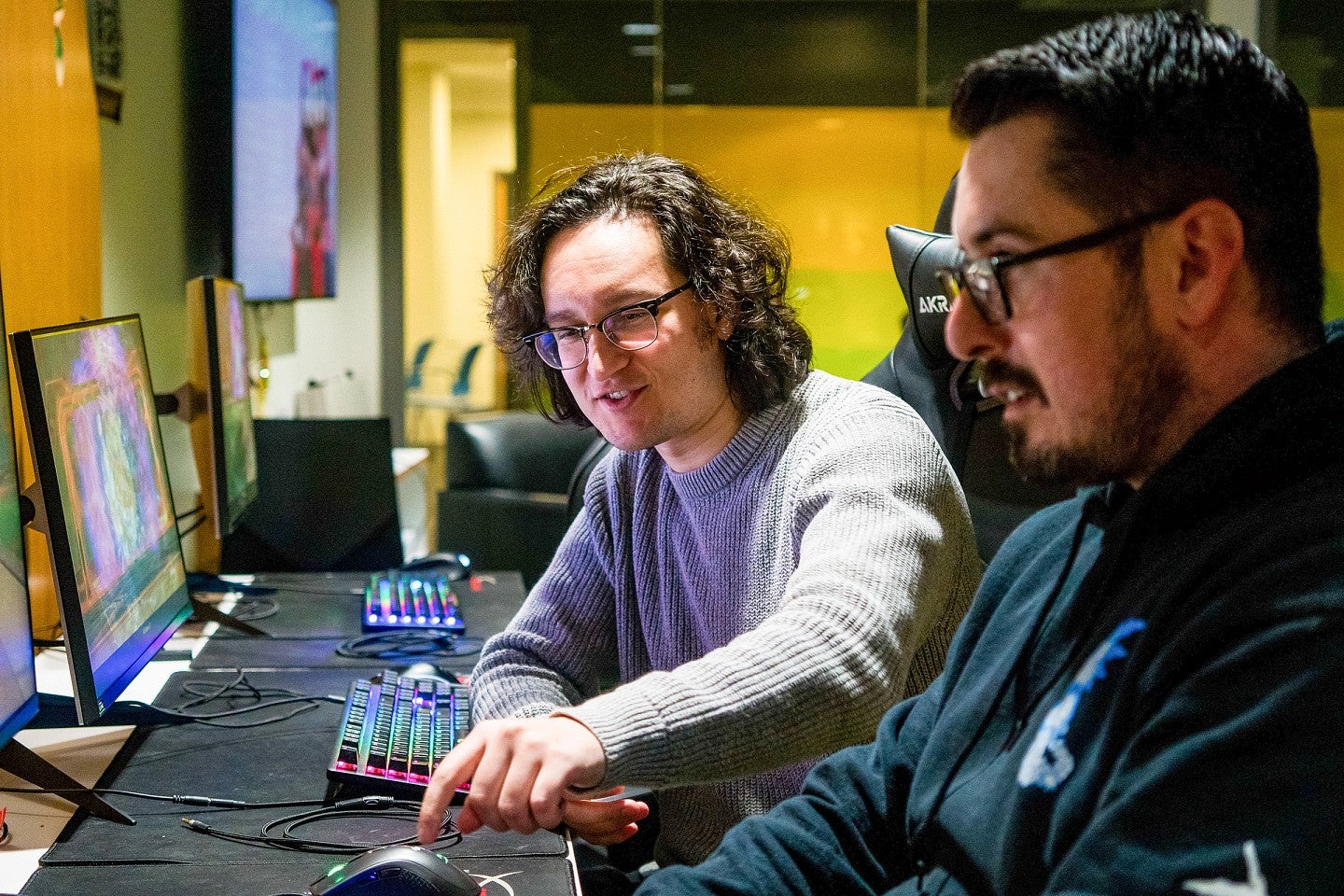
Foxman explained that the communications-focused approach is what makes the SOJC’s developing game studies minor unique.
“Early programs tended to focus on fostering design skills in students when it came to game studies. However, our program is leading a wave of curricula that aim to teach students that games are culturally, socially and economically situated,” he said. “In other words, we recognize that games are part of the broader media ecosystem and aim to give our students intellectual and practical tools that can allow them to act as natural bridges between game and other media industries, as well as be leaders in growing communications departments at game studios.”
The SOJC is also furthering game research and writing in its Immersive Media Lab, where any student can play VR games, experiment with technology and participate in themed nights like Beat Saber tournaments. Other activities happen annually at Allen Hall, like the Center for Science Communication Research’s Climate Change Game Night.
The UO Esports Broadcasting group, advised by Foxman, practices game journalism in the form of shout-casting the games that varsity UO Esports teams compete in. The SOJC’s Experience Hub is where students can practice using industry-standard livestreaming software and experiment with virtual reality headsets, greenscreens and other tools.
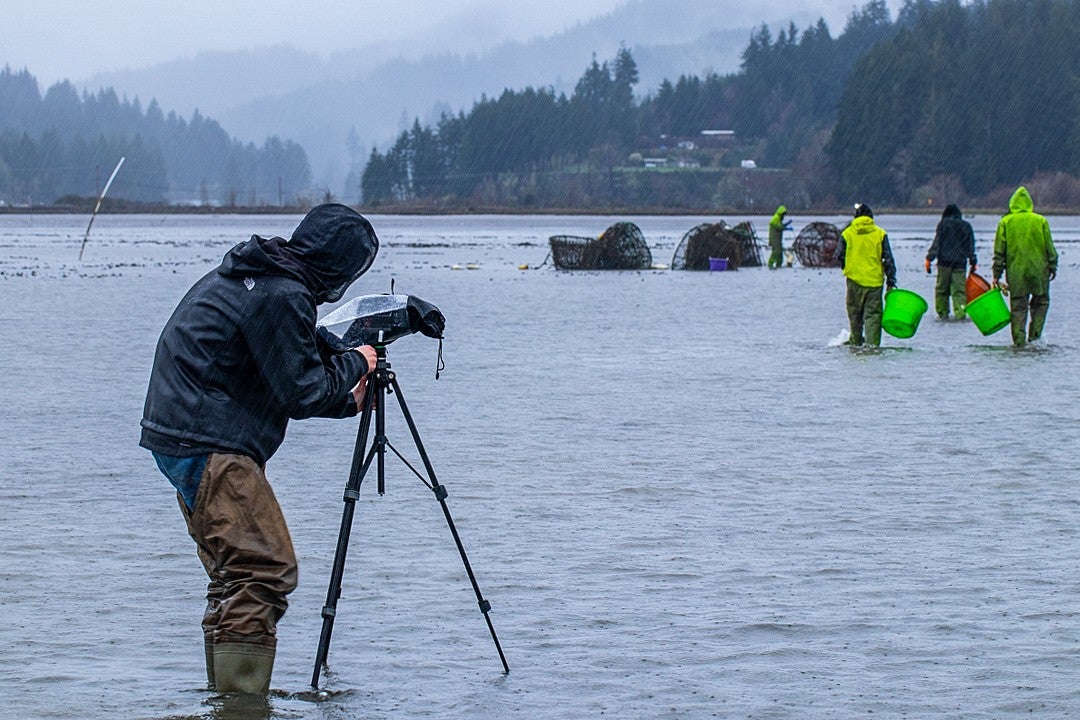
According to Block, the documentary production minor will consist of more courses in the areas of history criticism and theory and will cover aspects of film history and production that would normally be a part of the documentary pathway. The minor will also give students movie-making skills and experience. The faculty are adding courses on the business of documentary, documentary masters and documentary aesthetics to their existing offerings in Latino roots, Black American television, and human rights and cinema.
“If you’re training journalists today, you have to allow them to become as conversant with the language of moving-image media as they are with the English language because they are both equal in value,” said Block. “Interestingly enough, a TikTok or YouTube video can reach far more people than the front page of The New York Times. If you want to tell stories, why not tell stories that can reach 50 million people rather than reach 1.5 million who read The New York Times? There’s no reason why a print journalist couldn’t be concurrently making a movie, researching and writing a New Yorker-type story. If you’re going to write a quarter-million words, why not make a movie?”
While the future of communication is not 100% predictable, the SOJC’s communication and media studies programs have the research chops to offer the strongest advantages to both undergraduate and graduate students.
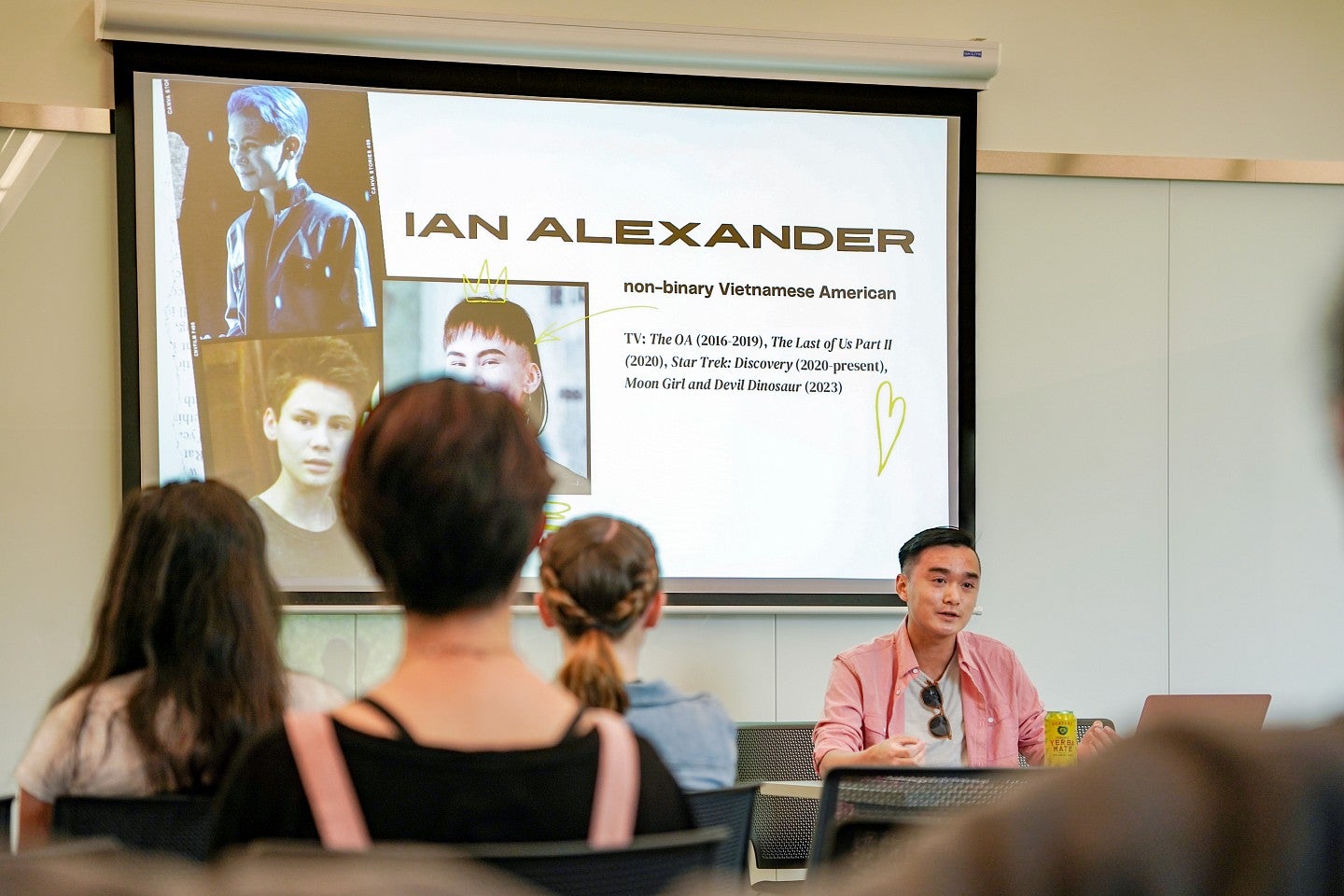
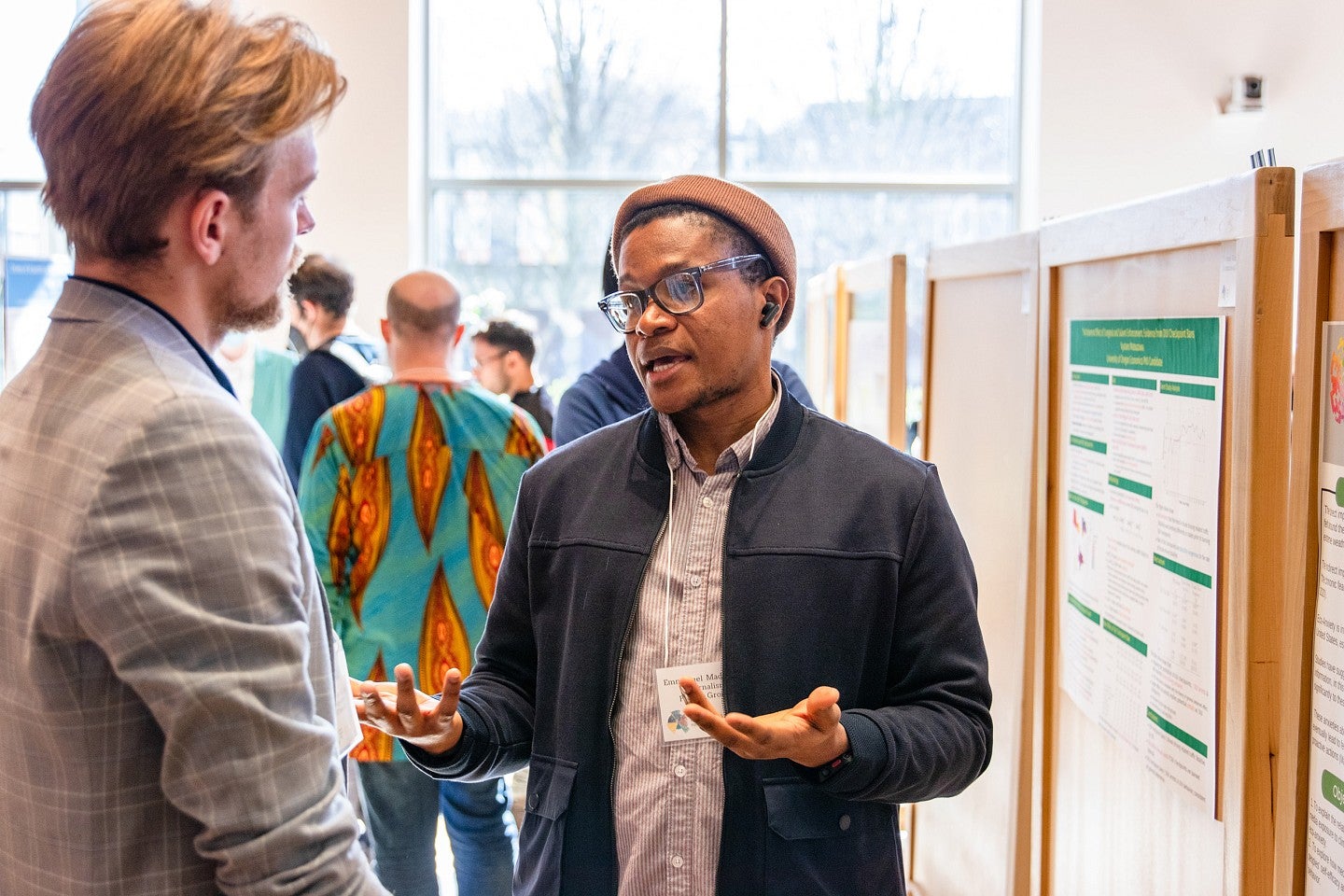
Communication and media studies at the graduate level
The strong research foundation is one of the reasons why a good number of media studies majors and grad students go into academia. They are also well prepared to pursue careers in law, business or nonprofit work because the SOJC media studies major puts so much emphasis on research and evidence-based thinking.
“I want students to see how research can have academic rewards, but also it can be used to really benefit practice. Professional practice can be informed by the findings of research,” said Bryce Newell, media studies associate professor and director of the SOJC Honors program. “I hope the students go through the program with a stronger appreciation for research in general, how it interacts with their chosen fields and how it can improve their chosen fields and the way they do their work.”
At the SOJC, the Communication and Media Studies (CMS) Master's and Doctoral programs begin with grounding courses in theory and research methods, and then students focus on specific interests with courses outside and inside the school, independent study courses with faculty, and thesis or dissertation research.
“Through this intensive process, there’s an evolution of students' own thinking, and it takes them to the next level of synthesis in their minds,” said Newton. “The combination of scholarly and personal growth with a cross-disciplinary focus prepares them to contribute innovative and impactful research to scholarly and professional fields."
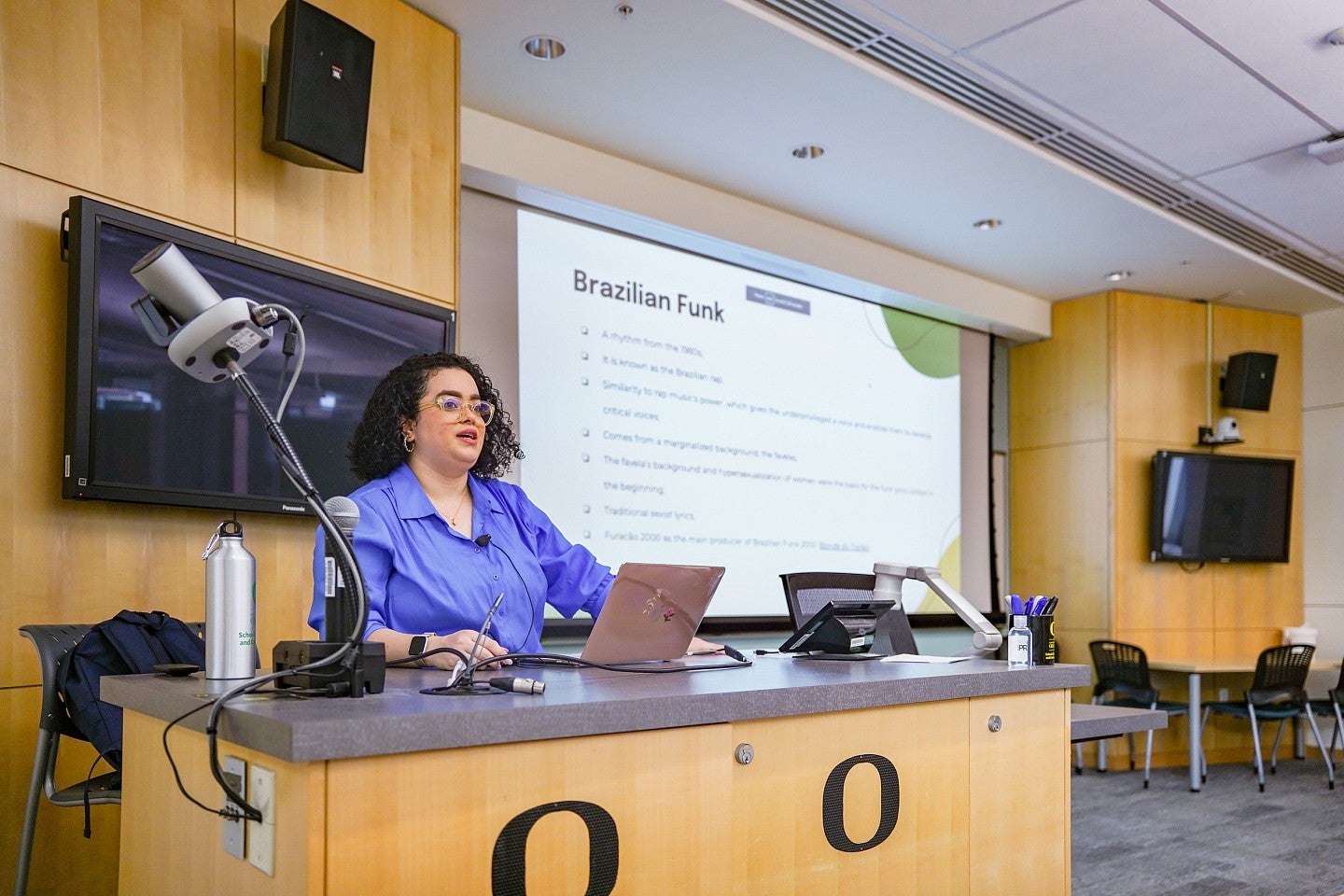
Journalism instructor Charlie Deitz earned his master’s and doctorate in communication and media studies from the SOJC. Reflecting on his experience, he emphasized the faculty’s commitment to each student.
“Honestly what makes this program is the people because they are willing to be flexible," he said. "We have holistically curious faculty who want to keep growing their skillset and be able to angle in what’s happening next. That I think is the hallmark.”
Deitz credits the SOJC’s master’s and doctoral programs for providing him with critical thinking skills to understand complex issues.
“What it really did is help develop me as a better thinker," he said. "Something that I’ve always wanted in my life is to better comprehend. I grew up with comprehension problems like reading, so it was an extra challenge for me. It gave me a better system for understanding really complex things, which is what I wanted. It increased my confidence as a teacher, and I’d wanted to be a teacher for a long time. That was the passthrough. Now I get to be on the other side of the podium properly, and I feel like I’ve earned my place there.”
According to Newton, SOJC’s students have a strong focus on social justice and ethics throughout their research, with a global orientation. Students come into graduate school with a range of backgrounds and interests, such as game studies, health communication in Pakistan, indigenous storytelling in Nigeria, and how best to communicate about scientific innovations and environmental concerns.
“Our students create new bridges between what was traditionally journalism and communication scholarship and other disciplines in social and natural sciences, the humanities and the arts,” she said. “We need those new ways of thinking and knowing across the disciplines to address the world's challenges, and that’s what our students are doing.”
—By Sydney Seymour, class of ’25
Lauren Tokos, class of ’24, contributed to this story.
Sydney Seymour '25 (she/her/hers) is a media studies major minoring in ethics. She is a writing intern for the SOJC and the executive writing editor for Align Magazine. Connect with her on LinkedIn.
Lauren Tokos '24 (she/her/hers) is a media studies major with a minor in commerce and society. She is also a student in the Clark Honors College and member of the Wayne Morse Scholars Program.
